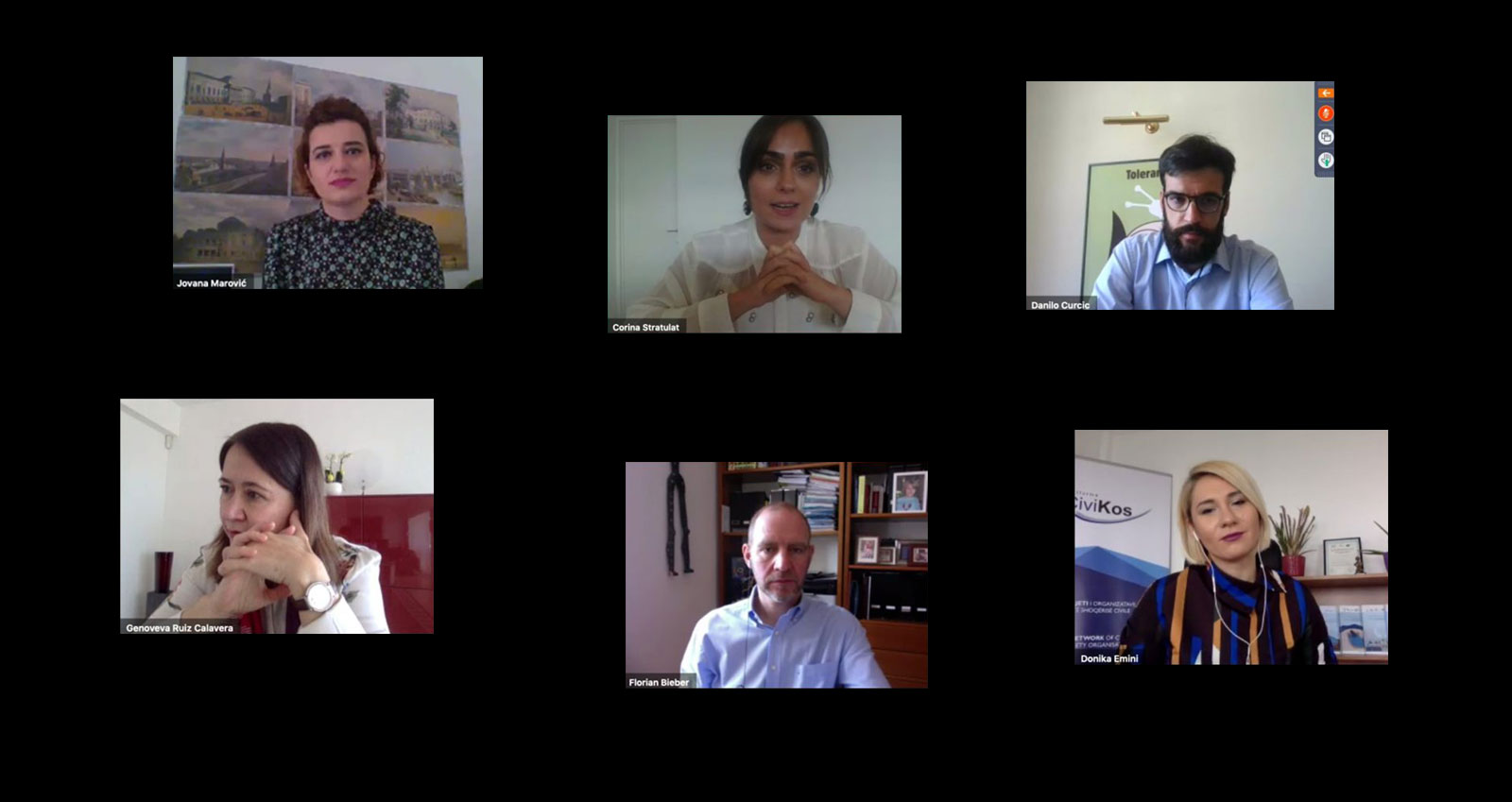

The list of speakers included our BiEPAG Members Florian Bieber (Director of the Center for South East European Studies at the University of Graz and BiEPAG Coordinator), Jovana Marovic (Director of Politikon Network) and Donika Emini (Executive Director – CiviKos Platform) who were joined by Genoveva Ruiz Calavera (Director for the Western Balkans, DG NEAR, European Commission) and Danilo Curcic (Programme Coordinator, A11* Initiative for Economic and Social Rights, Serbia). Corina Stratulat (Senior Policy Advisor at EPC and BiEPAG Member) was moderating this online discussion on the challenges brought by the COVID-19 both in the Balkans and EU and the couple of raised questions around it: How have the countries of the Western Balkans responded to the situation, and where do they require more support? How can the EU prove itself in these challenging circumstances, and can it counteract the soft power of China and Russia? What will happen in those countries where the electoral cycle has been disrupted, and what will be the medium- and long-term impact of the crisis for the region?
When it comes to the Balkans, the crisis has caused elections to be postponed across the region, toppled the government in Pristina, and put a huge pressure on the countries whose economies are already struggling. Jovana Marovic shared her views on the response to the Covid19 in Montenegro.
Although a state of emergency is not declared, the government acts like it is using its already proven unlimited power to introduce fast-track changes of the laws in an non-transparent way by violation of the human rights, misuse of procedures, etc.
She also stressed that the freedom of media is also a subject that should be closely monitored during the Covid19 crisis, having in mind the number of incidents, arrests and limited freedom of expression. Besides the financial support, EU must also monitor the state of democracy human rights and consult the NGO sector in this process.
Danilo Curcic from A11 Initiative reported on the response of Serbia to the Covid19 crisis stating that despite the government’s public discourse and the first wave of measures that were undertaken, there was still no single measure to mitigate the crisis impact to the underprivileged, socially marginalized groups like the Roma, migrants, displaced persons, etc.
Donika Emini shared her insights on the current political crisis in Kosovo, after the non-confidence vote against the Prime Minister Albin Kurti stating that being a citizen of Kosovo in a situation when they are supposed to fight the Covid19 with limited capacities and overburdened by the political crises and state capture is disturbing.
This crisis is also an indicator that EU has lost its transatlantic fight and that EU position is getting weaker. This is not just because of the pandemic, because we also have the visa liberalization issue, the stuck dialogue, appointing Miroslav Lajcak as EU Special Representative – said Emini.
She also shared her observations that the Kosovo’s government needs more help from the international community in regard of all the interventions in the North and that EU still has a chance and must make a comeback in the next period.
Florian Bieber noted that the Covid19 crisis and the response to it has once again showed that the trust among the citizens and states is limited, raising his concerns and fear that the pre-existing trends and authoritarian reflexes will accelerate and increase during and in the aftermath of the pandemic both in the Balkans and in the EU.
BiEPAG will publish a new study next week and it will encompass all the aspects of the Covid19 crisis and its repercussion for the Balkans. Maybe it is early to say what will predominate - a shift to more repressive authoritarian climate, or reforms and stabilization.
When it comes to the EU’s credibility, it was once again brought into question, both at home and abroad. Ms. Genoveva Ruiz Calavera stated that EU's priority is to support health systems and mitigate the socio-economic impact, as well as to upheld freedom, democracy, the rule of law amp; respect for human rights in these challenging times. Speaking of the Balkans, she pointed out.
Without doubt, EU is the most stable partner of the region. We are proving our solidarity with the region with an initial package of 38 million euros. Also, amidst the Covid19 crisis the member states reached the political agreement on opening of accession talks with Albania and North Macedonia.
Ruiz Calavera announced that they are preparing a new communication on the instruments that will be used to fight the economic consequences through a new package of financial help that will be infused in the Balkans.